Chinese New Year Traditions, Superstitions and Taboos: A Guide
Learn the legends, superstitions and witty wordplay behind these Chinese New Year traditions
- There are many traditions, superstitions, and taboos during the Chinese New Year.
- Many of these customs centre around beckoning good fortune and prosperity. The colour red represents exactly that in Chinese culture, making it apt for the décor and festivities.
- Regardless of how many customs you may follow, do not forget that Chinese New Year is about reunions and gatherings. It is about family.
Chinese New Year is the most widely celebrated Chinese holiday across the globe. Various Chinese New Year traditions have been passed down, based on myth, symbolism and superstition, as a holiday that dates back thousands of years. Each person may choose to celebrate a little differently based on preferences, beliefs and geographical location. Yet almost everyone spends time with family and eats Chinese New Year food.
Chinese New Year is also referred to as Lunar New Year, a term that includes other cultures that celebrate the start of the new year using the same calendar system. In China itself, it’s known as the Spring Festival. The Spring Festival is a time of celebration. It means to welcome the new year with a smile and let fortune and happiness continue. At the same time, the Spring Festival involves sombre ceremonies to wish for a good harvest. Strict rules and restrictions go without saying!
Whether in China or elsewhere globally, these are some of the most common Chinese New Year traditions, superstitions and taboos. And it’s no accident that eight is listed as eight is the luckiest number in Chinese, since eight in Chinese sounds similar to the Chinese word for prosperity.
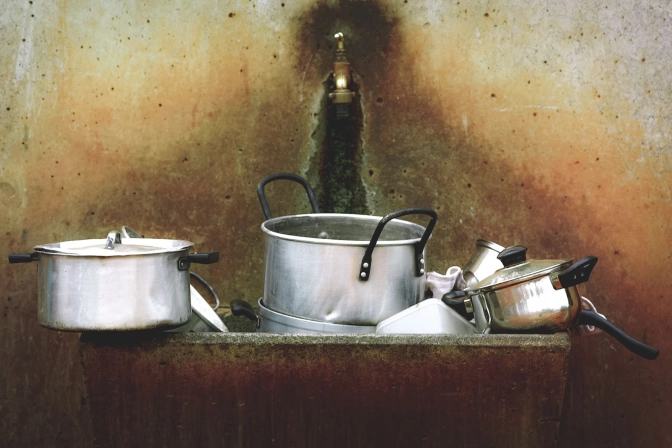
1. (一) Clean Up Your Act
Each year is seen as a fresh new beginning. Starting it off with a clean house is essential. However, the timing of your cleaning is crucial. Leading up to the New Year, you should clean as much as possible to clear out the bad luck and any leftover ill feelings from the previous year.
On the Lunar New Year itself, you are not supposed to do any cleaning at all. The new year brings luck, and cleaning will remove all of that. People also postpone taking out the garbage for the first few days of the new year since this act symbolises good luck being thrown away. In fact, household chores are generally avoided during Chinese New Year celebrations since it’s seen as a foreshadowing of the hard work one would have to do in the year ahead.
So no wiping, sweeping or showering, and leave the dirty dishes from that delicious New Year’s feast in the sink for the night!
2. (二) Fortune Favours The Decor
The colour red is strongly favoured during the Chinese New Year. The colour is associated with good fortune and prosperity. The origins of red’s lucky properties may stem from a legend about a beast named Nian (an approximate homophone for the Chinese word for year), who appeared on New Year’s Eve to wreak havoc. People figured out that Nian was afraid of the colour red, and to this day, people hang red lanterns, couplets written on red paper, and the character fu (meaning good fortune) on red paper.
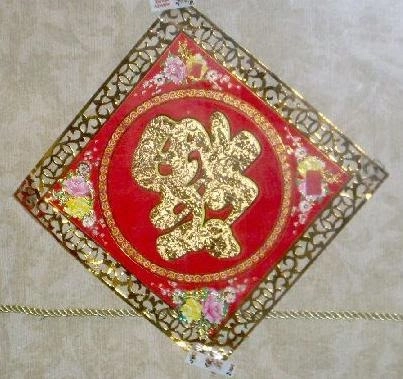
Interestingly, that character is usually hung upside down. People will often hang depictions of the character fu, embossed onto little wooden labels outside their homes and businesses but always upside down. The reason for this comes down to a cunning bit of wordplay - the character for ‘upside down’ (dao) is pronounced the same as the character for ‘arrive’. Therefore, by turning fu decorations this way, it symbolises wishing for good luck to arrive.
3. (三) Fill Up With Auspicious Food
One of the most popular Chinese New Year traditions is food. Who doesn’t love an excuse to eat a festive meal? These dishes also have special symbolism attached to them. For instance, long noodles are usually eaten during the Chinese New Year. The length of the noodles represents living a long, prosperous life. Therefore, the longer, the better!
In addition to these long-life noodles, spring rolls (shaped like gold bars) and dumplings (which resemble silver ingots or boat-shaped blocks) are eaten for prosperity, and many other foods are eaten because of how their names sound. For example, the word for fish in Mandarin sounds like the word for surplus. Often, fish for Chinese New Year dinner is prepared steamed and whole. Don’t worry if you can’t finish it—leaving a little leftover further enhances one’s surplus.
Tossing raw fish salad, or ‘lao yu sheng’ in Mandarin, is a fairly new Chinese New Year tradition that is fast gaining popularity. The dish was designed to be delicious and entertaining at diners. Every ingredient represents a different blessing, and the appropriate Chinese idiom is said every time an ingredient is tossed in.
And the fun does not stop there. Once all ingredients are in, everyone gathers around the table, chopsticks in hand, and tosses the salad while speaking words of blessing and well wishes. The Chinese believe that higher tosses represent greater progress, substantial growth and prosperous wealth for everyone present at the salad toss. Of course, this is not guaranteed; What is assured is a big and colourful mess of raw fish and other assortments.
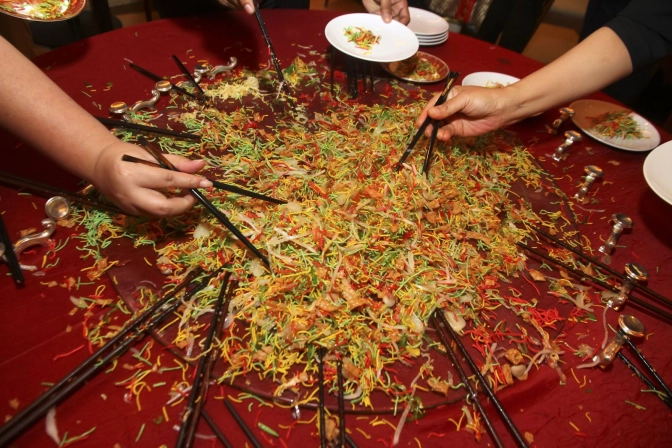
4. (四) Handing Out Red Packets
This one might be a young person’s favourite among all the Chinese New Year traditions. Little red packets containing money are given to loved ones every new year. Elders or married couples usually provide these packets, called hong bao in Mandarin or lai see in Cantonese, to children and single people of a younger generation. According to legend, giving children eight coins in a red packet protected them from a demon named Sui who visited on the eve of Chinese New Year. However, this terrifying story is not widely shared anymore.
Giving out bills in packets of eight is always preferable. Generally, gifts and items are given out in even numbers. This is because the Chinese believe in harmony and balance. Even numbers are preferred over odd numbers as the Chinese believe doubles bring blessings. Oranges are exchanged in twos, along with Chinese couplets of blessings. However, never give gifts in amounts with the number four! Four in Chinese is an approximate homophone with the word for death, so take heed!
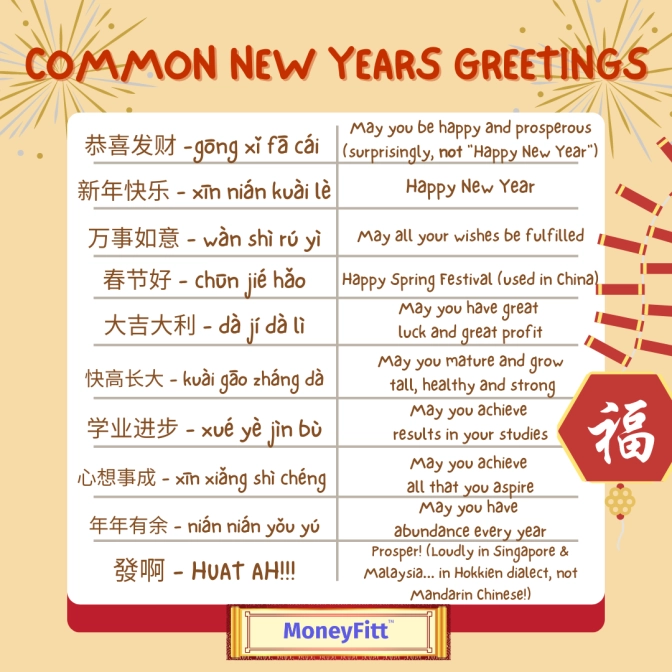
5. (五) Start Off With A Fresh Debt Slate
Chinese New Year is associated with prosperity and wealth. This Chinese New Year superstition revolves around the wealth of a person. If you are in debt, be sure to pay off the money before the Chinese New Year. The Chinese believe that starting the new year in debt means spending the next twelve months similarly. Similarly, lending money on Chinese New Year’s Eve or the first day of Chinese New Year is not a good idea either.
Many families and friends gamble with one another during the Chinese New Year Period. Make sure to settle any incurred debt on the spot! You would not want to start the new year in debt.
You should avoid demanding debt repayment during the new year as well. This custom is a show of understanding. It allows everyone a chance to celebrate without worry. If you knock on someone’s door demanding repayment, you will bring bad luck to both parties. However, it is fine after the 5th day. Borrowing money is also taboo. You could end up having to borrow money for the entire year.
6. (六) Leave That Hair Alone!
Similar to the custom of not cleaning during the new year, the washing and cutting of hair are also generally avoided. Some think that since the Mandarin pronunciation for hair (fa) is associated with the phrase “getting rich”, cutting your hair is like snipping away your good fortune. Another explanation is that long hair is a traditional symbol of longevity, and cutting your hair bodes ill for your lifespan. So, if you are thinking of looking fresh for Chinese New Year celebrations, stop procrastinating and get your haircut before it is too late!

7. (七) Partner For Hire
This is a fresh-new fact about Chinese New Year. Chinese New Year is a joyful time for most, but it is often stressful for singles above the “normal” matrimonial age. In China, females are said to be marriageable up to 30, and males before 32. For older singles, parents get incredibly anxious and worried. Desperate parents even arrange dating and prospective marriage partners for their single children.
An interesting (and often ridiculous) solution has appeared to solve this problem — renting a boyfriend or girlfriend for the new year. Websites and agents specialise in this business.
There is a burgeoning industry revolving around partner rentals in China, with a 2-hour hire running at around US$300! And even down in Singapore, a quick search shows the going rate at close to US$100. Questionable use of hong bao money... unless hong bao receipts are boosted for partnered offspring!
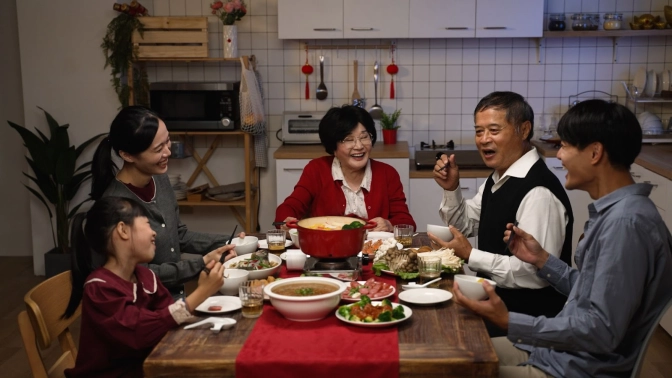
8. (八) Family Reunion
Family is the cornerstone of Chinese life. Naturally, one would aim to start each new year in the company of their loved ones.
In China, the Spring Festival comes with a one-week vacation. People across the country flock to their families in what is often called “the world’s largest human migration.”
The pandemic has made it harder for families to travel. Some may not have the means or ability to get together. Suppose you are separated from family on Chinese New Year but still want to celebrate together somehow. In that case, you can consider meeting each other virtually to share a meal or conversation.
It is a tradition for families to gather for a reunion meal on the eve of Chinese New Year. This usually signals the beginning of festivities which lasts for 15 days. On the 15th day itself, the Chinese observe Chap Goh Mei (or Chap Goh Meh), a festival celebrated just as heartily as Chinese New Year's Eve. Chap Goh Mei is known as the Lantern Festival or Yuan Xiao Jie in certain parts of the world. This marks the end of the 15-day Chinese New Year celebrations.
The Chinese celebrate Chap Goh Mei by partaking in major activities such as eating glutinous rice balls (tang yuan) over a grand meal, solving riddles written on majestic lanterns and visiting temples to pray for their families and friends. Interestingly, Chap Goh Mei is also known as the Chinese Valentine’s day.
In ancient times, all single ladies would throw Mandarin oranges marked with their contact information into lakes and rivers in the hope of finding true love. In modern times, single women pose with oranges and post those photographs on social media instead. Imagine Bumble, but with oranges.

At the end of the day, many Chinese New Year traditions are based on superstition. Some of us are more sensitive to such taboos, while some brush it off as old wives’ tales. It can be rather overwhelming to the uninitiated! Hopefully, this quick guide has helped you understand the Chinese New Year’s many facets and tenets. Remember to stay positive, stay with family and have fun during this festive period!
EIGHT TREASURES FOR THE CHINESE NEW YEAR. COMPLETED. ✅
Sources:
